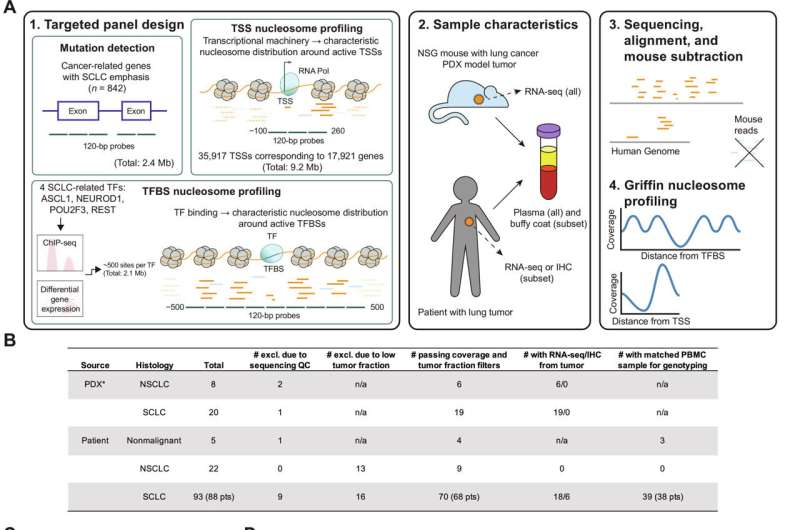This article has been reviewed according to Science X's editorial process and policies. Editors have highlighted the following attributes while ensuring the content's credibility:
fact-checked
peer-reviewed publication
trusted source
proofread
Study suggests liquid biopsy could detect and monitor aggressive small-cell lung cancer

A new lab assay developed by researchers at Fred Hutch Cancer Center could make diagnosis and treatment of small-cell lung cancer and non-small cell lung cancer easier. The work is published in the journal Science Advances.
The blood-based test, also called a "liquid biopsy," can detect differences between types of lung cancer by examining patterns in cell-free tumor DNA in blood samples. It's a desirable option for detecting small-cell lung cancer (SCLC) as standard needle biopsies fail due to the number of smaller tumors typically present and the variety of tumor subtypes that indicate different treatment pathways.
"There is a deep need for blood-based assays that define subtypes in SCLC," said Fred Hutch SCLC researcher David MacPherson, Ph.D., who co-led the work with Fred Hutch computational biologist Gavin Ha, Ph.D.. "This new method is a step towards assays that would allow us to test and monitor disease, detect when it transforms into a different lung cancer type, and identify potential treatment targets even when standard biopsies aren't an option."
Such an assay could help oncologists tailor SCLC treatment when new, targeted strategies reach the clinic, and help them monitor patients for recurrence. In addition, it could detect when a patient's disease has switched from non-small cell lung cancer (NSCLC) to SCLC, which can occur after cancer cells gain resistance to certain targeted therapy and help guide a patient's prognosis and inform new treatment strategies.
Similar assays could also be used to improve clinical trials, helping identify trial candidates or providing researchers with information about why a certain patient may or may not respond to treatment.
To build the new assay, the research team developed a targeted strategy analyzing pre-clinical mouse models using human tissue in which cell-free tumor DNA was easier to sift out from DNA released by healthy cells. They found that the assay performed well when predicting whether DNA had come from an NSCLC or SCLC tumor, suggesting that their approach has potential for detecting when a patient's tumor transforms from NSCLC to SCLC.
"Our approach demonstrates that a full-featured circulating tumor DNA assay has the potential to classify clinical subtypes driven by transcriptional programs," said Ha, an associate professor in the Herbold Computational Biology Program at Fred Hutch. "This approach is especially important for SCLC and other tumors that may not have genetic mutations that can inform treatment decisions. The assay expands the boundaries for potentially using circulating tumor DNA to improve treatment selection and cancer management."
According to the American Cancer Society, 10–15% of all lung cancers are SCLC; an aggressive disease that is prone to metastasize or spread. About 238,340 people were diagnosed with lung cancer in the U.S. in 2023, and about 14% of them had SCLC. Most patients are diagnosed with late-stage disease and as few as 6% are alive five years after diagnosis.
More information: Joseph Hiatt et al, Molecular phenotyping of small cell lung cancer using targeted cfDNA profiling of transcriptional regulatory regions, Science Advances (2024). DOI: 10.1126/sciadv.adk2082




















